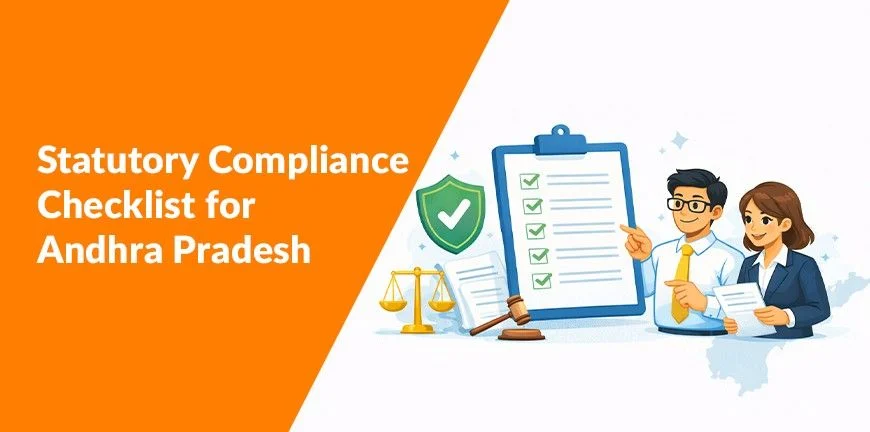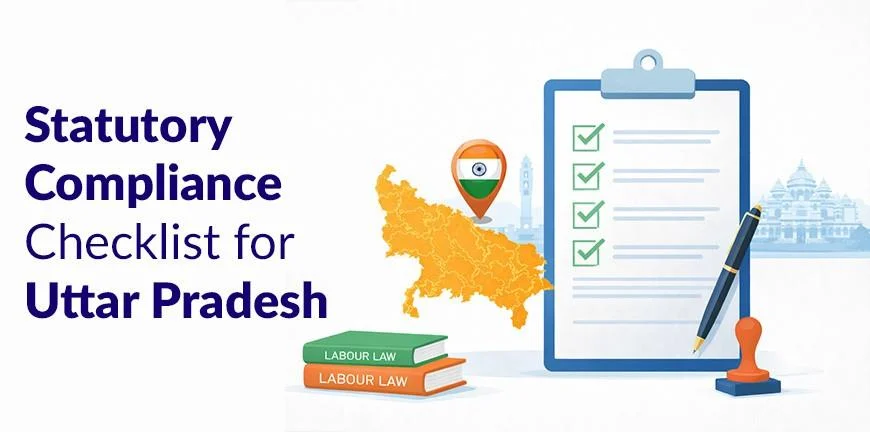
What is Effective Staffing? Definition, Process and Types
15/05/2025
10 Recruitment Mistakes and How to Avoid Them?
19/05/2025- What is the Definition of Shop and Establishment Act Compliance?
- What is the Importance of Shop and Establishment Act Compliance?
- How does Shop and Establishment Act Compliance Checklist Works?
- What are the Penalties for Non-Compliance?
- Are You Looking for Compliance Partner?
- Frequently Asked Questions (FAQs)
In͏͏ India,͏͏ there͏͏ are͏͏ about͏͏ 25͏͏ million͏͏ shops͏͏ and͏͏ establishments͏͏ that͏͏ employ͏͏ over͏͏ sixty͏͏ million͏͏ workers.͏͏ These͏͏ institutions͏͏ come͏͏ under͏͏ the͏͏ umbrella of͏͏ shops͏͏ and͏͏ establishments͏͏ act implemented͏͏ by͏͏ the͏͏ concerned͏͏ state͏͏ governments.͏͏ Compliance͏͏ in͏͏ such͏͏ a͏͏ scenario,͏͏ becomes͏͏ necessary͏͏ for͏͏ protecting͏͏ the͏͏ rights͏͏ of͏͏ millions͏͏ of͏͏ employees͏͏ working͏͏ in͏͏ different͏͏ states͏͏ and͏͏ to͏͏ make͏͏ employers͏͏ more͏͏ accountable.
A͏͏ Shop͏͏ and͏͏ Establishment͏͏ Act͏͏ compliance͏͏ checklist͏͏ becomes͏͏ paramount͏͏ as͏͏ violations͏͏ can͏͏ lead͏͏ to͏͏ legal͏͏ trouble͏͏ and͏͏ tarnish͏͏ the͏͏ brand͏͏ reputation.͏͏ Let͏͏ us͏͏ gather͏͏ more͏͏ insights͏͏ on͏͏ what͏͏ is͏͏ Shop͏͏ and͏͏ Establishment͏͏ Act͏͏ compliance͏͏ and͏͏ how͏͏ we͏͏ can͏͏ achieve͏͏ it.
What is the Definition of Shop and Establishment Act Compliance?
Shop and Establishment Act Compliance definition states that ” Any company or establishment that comes under the purview of “Shops and Establishment Act 1961″ must ensure their operations, policies, working conditions, and other statutory requirements are in line with the latest laws and regulations prescribed under the act by the respective state governments”.
Most͏͏ businesses͏͏ and͏͏ services͏͏ that͏͏ fall͏͏ under͏͏ the͏͏ S&E͏͏ Act͏͏ must͏͏ align͏͏ their͏͏ operations͏͏ and͏͏ policies͏͏ with͏͏ the͏͏ rules͏͏ specified͏͏ under͏͏ the͏͏ act.͏͏ Moreover,͏͏ Shop͏͏ and͏͏ Establishment͏͏ Act͏͏ compliance͏͏ must͏͏ be͏͏ achieved͏͏ by͏͏ firms͏͏ to͏͏ protect͏͏ employee͏͏ rights͏͏ and͏͏ prevent͏͏ hefty͏͏ fines.
The companies and establishments that are overseen under the S&E Act are:
- Commercial Establishments: Companies that offer different services related to banking, trading, BFSI,
- Shops (Big or small): Retail shops, malls, warehouses, etc.
- Hospitality industries: Restaurants, hotels, eateries, etc.
- Entertainment and Recreation industries: Theatres (single screens and multiplexes), amusement parks, etc.
The major aspects of Shop and Establishment Act compliance checklist include:
- Ensure License & registration of shops or establishments are done immediately after commencing operations.
- Regulate employee working hours and ensure additional working hours are compensated.
- Provide Employee protection and all amnesties for best output.
- Safely store accurate records and documentation for internal and external audits.
- Ensure compliance with laws related to the Shop and Establishment Act.
What is the Importance of Shop and Establishment Act Compliance?
Shop and Establishment Act compliance is vital for businesses as it ensures legality, optimises business operations, protects employee rights, and helps create a safe and secure working environment. If all the Shop and Establishment Act compliance requirements are fulfilled, it can lead to:
1. Compliance and Ensuring Employee Protection
The Shop and Establishment Act legally mandates that businesses provide safe working conditions for employees. Commercial establishments must adhere to this legal framework to prevent penalties and lawsuits.
2. Fair Employment Practices
The Shop and Establishment Act compliance checklist ensures employee working hours, leaves, wages, overtime payments, and working conditions are regulated, bringing fairness and preventing exploitation.
3. Improve Credibility and Maintain Brand Reputation
Businesses complying with the S&E Act demonstrate a strong commitment towards ethical operations and legal practices. It builds credibility and trust among employees, customers, and stakeholders. A compliant business establishment will enhance brand value and create a positive environment for further investment.
4. Enhanced operational efficiency and accurate record-keeping
Compliance compels businesses to maintain accurate records and documentation. It also helps streamline operations and policies leading to improved efficiency and employee experience.
How does Shop and Establishment Act Compliance Checklist Works?
Businesses must fulfil the Shop and Establishment Act compliance requirements on a day-to-day basis to achieve compliance and improve operational efficiency. Here is the Shop and Establishment Act registration checklist that helps organisations meet the obligations stipulated under the S&E Act:
1. Licensing & Registration
- Businesses must obtain licenses and register under the S&E Act within deadlines after commencing their operations.
- Ensure registration and details are updated with the relevant government agency.
- Display registration certificate on the work premises.
2. Employee Working Hours and Overtime
- Ensure the workforce is not engaged more than the stipulated working hours (Ex: 9 hours per day or 48 hours per week).
- Provide proper overtime pay in case employees stretch beyond their fixed working hours.
- Deploy a well-crafted work schedule that adheres to state-specific regulations.
3. Wage Compliance
- Ensure employees are paid proper wages on time as per employment standards without unauthorised deductions.
- Comply with the state-specific minimum wage law.
- Maintain accurate payroll records and provide payslips to employees with breakups.
4. Safety Protocols and Employee Welfare
- Provide all the basic amenities like canteen, drinking water, beverages, restrooms, security, etc., to employees at work premises.
- Implement safety measures to prevent accidents and injuries. Also, deploy fire prevention equipment and emergency evacuation systems.
- Ensure no child labour is engaged in work.
5. Workplace Policies and Employee Rights
- Prevent gender discrimination and unethical labour practices.
- Implement a POSH policy to manage and address sexual harassment in the workplace.
- Create proper work termination and notice period policies for managers and employees.
- Practice fair employment policies and include grievance redressal mechanisms that ensure quick resolution.
6. Records and Documentation
- Store and maintain employee attendance records, registers, payroll records, and leave information.
- Ensure proper documentation is maintained for appointment letters and contracts.
- Maintain audit and compliance reports as per the state requirements.
What are the Penalties for Non-Compliance?
Here are the penalties levied by government authorities on businesses for not complying with the Shop and Establishment Act compliance checklist:
1. Fines for registration after the due date
Businesses that fail to register their companies or establishments under the S & E Act within the prescribed timeline must pay fines which vary based on the delay and state’s fine policies.
2. Fines for non-maintenance of registers
As per the Shop and Establishment Act registration checklist, business owners must ensure all records such as payroll, attendance, leaves, and other transactions are maintained accurately. Any violation or missing information can lead to severe penalties that can range from thousands to lakhs.
3. Fines for non-compliance with working hours
Companies must follow the prescribed working hours for employees per week. Any extensions must be compensated with overtime pay failing to which can lead to hefty fines.
4. Fines for non-compliance with non-payment of wages
Businesses must pay their employees as per the accepted terms and timeline. Any non-payment or unauthorised deductions lead to penalties and legal hassles.
5. Fine for non-compliance with leave policies
Employees are entitled to a fixed number of leaves in a year like sick leaves, paid leaves, and holidays under the S&E Act. Employers failing to provide sufficient leaves as per regulations are liable to pay penalties and lawsuits.
6. Legal Action
In certain cases, the governing agencies or employees may file civil or criminal cases against the business owners for violating the regulations of the Shops and Establishment Act. This will not only damage the brand’s reputation but also reduce trust among employees and stakeholders.
7. License Cancellation
In extreme cases, a company may lose its business license for frequent violations and frauds against the S&E Act. This can result in the closure of businesses and lawsuits based on the severity of the offence committed.
Are You Looking for Compliance Partner?
Navigating through the tedious legal frameworks and executing the Shop and Establishment Act compliance checklist efficiently can be challenging and complex for most business entities. However, to mitigate risks and ensure 100% compliance with the S&E Act, partnering with a top compliance agency like ALP Consulting can be a game changer. With ALP as your S&E Act compliance partner, you can:
- Ensure legal compliance
- Prevent penalties and lawsuits from government bodies.
- Streamline operations and improve efficiency.
- Get expert guidance on risk mitigation.
- Thorough audit with best outcomes
- Stay up to date with changes and amendments in the Shop and Establishment Act.
- Focus on other core activities and improve profitability.
Frequently Asked Questions (FAQs)
1. What is the Shop and Establishment Act compliance checklist?
The Shop and Establishment Act compliance checklist ensures businesses adhere to regulations and laws prescribed under the S&E Act. The checklist includes licensing & registration, employee working hours and overtime, wage compliance, safety protocols and employee welfare, workplace policies and employee rights, records, and documentation.
2. Who needs to comply with the Shop and Establishment Act?
The business entities that need to fulfil Shop and Establishment Act compliance requirements include shops (wholesale and retail, commercial establishments like banks, offices, hotels, theatres, pubs, amusement parks, etc.
3. What are the penalties for non-compliance?
The penalties for non-compliance with the S&E Act vary based on the seriousness of the violations. The consequences of not meeting Shop and Establishment Act compliance requirements include penalties, hefty penalties, revoking of licences, legal cases, and in some cases imprisonment.
4. How does the Act protect employee rights?
The S&E (Shops and Establishments) Act regulates various aspects of employment and operational needs for the companies registered under the act. By adhering to these regulations, companies are compelled to safeguard employee rights and provide them with the best facilities and compensation to perform their tasks and earn their living.
5. How does the Act regulate working hours and leave?
Under the S&E (Shops and Establishments) Act, business owners must engage employees for a fixed number of working hours as prescribed under the act. Any additional hours must be compensated with overtime pay or additional leaves. Also, employees are entitled to several types of leaves such as casual, sick, paid time off, etc., under the act and any violations or non-approval of leaves can lead to penalties and lawsuits.
Contact Us For Business Enquiry

Hariharan Iyer
Hariharan Iyer is the Vice President – Operations at ALP Consulting, bringing over 40+ years of experience in HR outsourcing and labour law compliance. He leads end-to-end HRO operations, ensuring process efficiency, statutory compliance, and seamless service delivery for clients across industries. With a strong background in labour law governance and workforce management, Hariharan plays a key role in driving operational excellence and compliance-led HR solutions at ALP Consulting.




